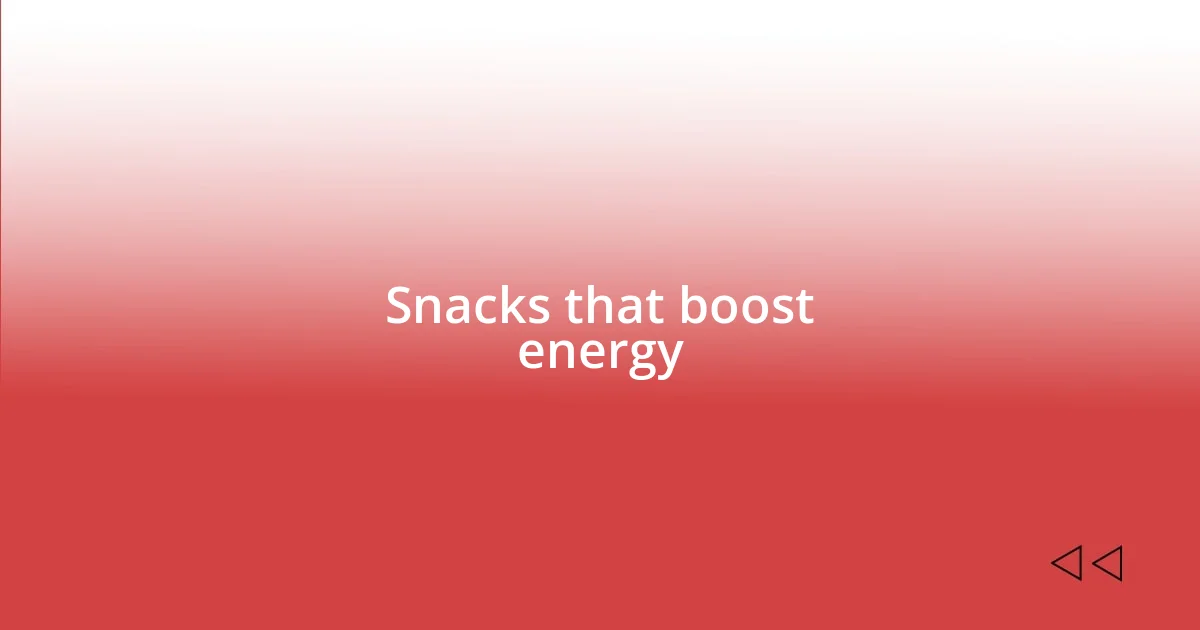Key takeaways:
- Understanding the role of carbohydrates, healthy fats, and proteins is crucial for maintaining optimal energy levels throughout the day.
- Consuming whole foods increases energy and focus, while processed foods often lead to energy crashes.
- Meal timing and choosing the right snacks significantly impact productivity and sustained alertness.

Understanding energy food types
When it comes to energy foods, understanding the different types is crucial to making informed choices. For instance, I’ve learned through trial and error that carbohydrates are often our primary energy source. The way they fuel my workouts never ceases to amaze me—especially when I enjoy a hearty bowl of oatmeal before heading to the gym. Can you feel the difference between a complex carb and a simple sugar? It’s quite remarkable how they affect my energy levels!
Fats also play a significant role in energy production. While some might shy away from them, I’ve found that healthy fats like avocados and nuts keep me feeling satisfied longer. They release energy slowly, offering that steady fuel throughout a long day. Isn’t it interesting how something like a handful of almonds can keep a mid-afternoon slump at bay?
Moreover, protein isn’t just for building muscles; it’s vital for sustaining energy too. I personally noticed an uptick in my energy after adding more protein-rich foods, like Greek yogurt and lean meats, to my diet. After all, who doesn’t want to feel energized and alert? These food types work together, creating a balance that is essential for optimal energy throughout the day.

Benefits of whole foods
Whole foods offer incredible benefits for maintaining energy levels. I often find that when I eat whole foods, such as fresh fruits and vegetables, I feel more energized and alert throughout the day. For instance, starting my morning with a smoothie packed with leafy greens and berries gives me a vibrant boost, making me feel ready to tackle whatever comes my way.
Not only do they provide essential nutrients, but whole foods are also rich in fiber, which aids in digestion and stabilizes blood sugar levels. I’ve experienced the difference firsthand; after switching to brown rice instead of white, I noticed much less energy crash after meals. This slow and steady energy keeps me focused and productive, allowing me to power through my tasks.
Additionally, whole foods are minimally processed, meaning they retain most of their natural nutrients. I remember a time when I was in a rush and opted for a pre-packaged snack instead of an apple. The difference in how I felt was striking. The fresh apple provided a burst of energy that the snack just couldn’t match. Eating whole foods not only nourishes my body but elevates my overall sense of well-being.
| Whole Foods | Processed Foods |
|---|---|
| Nutrient-rich | Often nutrient-poor |
| High in fiber | Low in fiber |
| Stabilizes energy | Can cause energy spikes |

Importance of balanced meals
Balanced meals are essential for maintaining steady energy levels throughout the day. I’ve noticed that when I skip meals or only snack on sugary items, my energy dips dramatically. There’s a big difference in how my body feels when I have a plate filled with the right mix of carbohydrates, proteins, and fats. A well-rounded meal allows me to experience sustained energy, transforming my productivity and mood.
Here are some key components of balanced meals that contribute to optimal energy:
- Complex Carbohydrates: Foods like whole grains provide lasting fuel for my workouts and daily activities.
- Healthy Fats: Nuts and avocados keep me full longer and prevent those frustrating energy crashes.
- Proteins: Lean meats or beans help me stay alert and focused, especially during long work hours.
I still remember a day when I opted for just a quick sugary snack instead of a balanced lunch. The inevitable energy slump hit me like a brick wall. That experience solidified my understanding of why balanced meals matter so much. They help me feel more energized and ready to meet the challenges of the day head-on!

Snacks that boost energy
Snacking can be a game-changer for maintaining energy, but it’s essential to choose wisely. My go-to energy-boosting snack is a handful of mixed nuts. They’re packed with healthy fats and protein, offering me a quick lift when I’m feeling sluggish. I remember one afternoon when the 3 PM lull hit, and I grabbed a small bag of almonds. Instead of the usual fatigue, I felt invigorated and ready to tackle the final tasks of the day.
I also find that pairing fruit with a protein source works wonders for my energy levels. Slicing a banana and spreading some almond butter on top not only satisfies my sweet tooth but also keeps me energized. Every time I indulge in this snack, I can feel the immediate impact. There’s something about that combination of natural sugars and healthy fats that really sustains me.
Don’t overlook the power of dark chocolate for a quick pick-me-up! I remember the first time I discovered that a square of dark chocolate could provide a mood boost in the mid-afternoon. It’s like giving myself a tasty little treat that comes with the added bonus of antioxidants. Just a small piece can melt away sluggishness, making me feel more alert and ready to engage with whatever’s next on my agenda. How great is that to have a delicious option that also gets my energy back on track?

Hydration and energy levels
Hydration plays a crucial role in how energetic I feel throughout the day. I’ve found that even slight dehydration can leave me feeling foggy and drained. There were times when I underestimated the importance of drinking water, thinking a cup of coffee would suffice. But after switching to a hydration-focused routine—like keeping a water bottle handy—I noticed a significant uptick in my overall alertness and productivity.
On days when I consciously hydrate, I experience a noticeable difference in my mood and energy levels. For instance, I’ll often fill up on water before a workout. Not only does it fuel my performance, but it also lifts my spirits. Have you ever felt that rush of refreshing clarity after gulping down a glass of cold water on a hot day? It’s almost like a reset button for my mind and body.
I’ve also dabbled in herbal teas as an alternative to plain water, especially during winter. The warmth and flavors provide comfort, and I genuinely feel more alive after sipping a cup. Plus, I like to think of them as an extra boost, full of antioxidants that support my overall wellness. Isn’t it amazing how something as simple as staying hydrated can illuminate our day-to-day energy?

Meal timing for optimal energy
Meal timing is a vital piece of the puzzle when it comes to maintaining optimal energy levels. I’ve learned from experience that having regular meals promotes steady energy, preventing those dreaded spikes and crashes. For instance, I’ve noticed that skipping breakfast sets the tone for a sluggish morning, so I’ve made it a point to start my day with a hearty meal. The immediate satisfaction I feel—along with a boost in concentration—validates that early nutrition is not just a habit, but a necessity for my productivity.
I often schedule my meals and snacks to align with my energy demands throughout the day. For example, I find that eating a balanced lunch around noon gives me a significant lift for the afternoon. There was a time when I pushed lunch to late afternoon and ended up feeling drained and unfocused. That experience taught me the importance of timing; proper meals can fuel our activities rather than distract from them. Have you ever noticed how a timely meal can make the difference between a productive afternoon and a sluggish one?
Additionally, I’ve experimented with the timing of my snacks. Whenever I have a mid-morning snack—like a protein bar or yogurt—I find that it sets me up nicely for the tasks ahead. It’s almost like giving my body a mini recharge to keep the momentum going. Isn’t it fascinating how simply adjusting meal times can lead to a more energized and focused version of ourselves? This little tweak has made all the difference for me, proving that optimizing energy is as much about when we eat as what we eat.

Foods to avoid for energy
I’ve learned that certain foods can sabotage my energy levels more than I initially realized. For example, overly processed snacks, while convenient, often leave me feeling sluggish shortly after consumption. Have you ever indulged in a bag of chips or a sugary treat and noticed that post-snack crash? It’s like the energy boost they promise is nothing but a fleeting illusion, making it crucial for me to steer clear of these energy traps.
Another common culprit is high-sugar breakfast cereals. Though they might seem like a quick meal option, I’ve found they rarely sustain my energy. I used to grab a bowl of my favorite sugary cereal on busy mornings, only to find myself fighting off an energy slump before noon. Switching to options rich in whole grains and fiber has made a world of difference, and I feel more energized and focused throughout the day.
Moreover, I’ve also become wary of excessive caffeine intake. Though it initially perks me up, too much caffeine often leads to jitters and an energy crash later on. I can recall days when I’d guzzle cup after cup, thinking I was being productive, only to feel drained as the day wore on. Finding balance with my caffeine sources has not only stabilized my energy but has also significantly improved my mood. Isn’t it interesting how making subtle changes in what we consume can profoundly affect our vitality and overall well-being?















